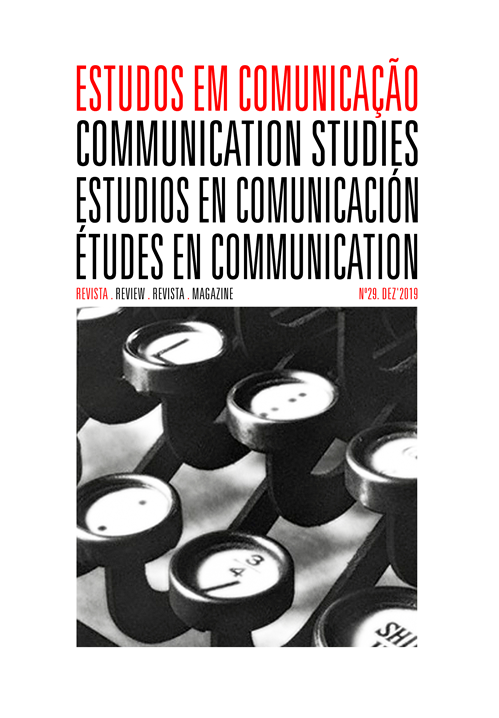On software and television: Analyzing a minimal process for software requirements specification by TV broadcasters
Palavras-chave:
TV production, requirements engineering, television software studies, software engineering, processes’ tailoring, agile methodsResumo
In this paper it is addressed the theme of software applications (apps) development and supply by TV broadcasters in order to synchronize the ads of TV shows’ sponsors between multiple screens. That sync is required because audience is using multiple gadgets to watch TV (for example, during the materialization of viewers’ second screen experience). Although broadcasters’ supply of apps to the audience constitutes an alternative to the ads sync, such supply requires a previous software development. The execution of a minimal set of activities to software development (particularly to software requirements specification) is analyzed in this paper, observing that such activities should minimize impacts in the typical production processes of TV to mitigate the risk of broadcasters losing their focus on TV content production while developing the apps. The presentation of (i) Software Engineering processes’ tailoring and of (ii) agile methods contributes to analyze a minimal process for software requirements specification.Referências
Ambler, S. (2004). Modelagem Ágil: práticas eficazes para a Programação eXtrema e o Processo Unificado. Porto Alegre: Bookman.
Beck, K. (2004). Programação eXtrema (XP) explicada: acolha as mudanças. Porto Alegre: Bookman.
Carneiro, R. (2012). Publicidade na TV digital: um mercado em transformação. São Paulo: Aleph.
Chrissis, M.; Konrad, M. & Shrum, S. (2010). CMMI for Development: guidelines for process integration and product improvement. Boston: Addison-Wesley.
Demarco, T. (1989). Análise estruturada e especificação de sistema. Rio de Janeiro: Campus.
Douglas, P. (2015) Future of television: your guide to creating TV in the new world. Studio City: Michael Wiese Productions.
Jacobson, I.; Booch, G. & Rumbaugh, J. (1999). The Unified Process Development Process: the complete guide to the Unified Process from the original designers. New Jersey: Addison-Wesley.
Jacobson, I. & Seidewitz, E. (2014). A New Software Engineering. Communications of the ACM (The Association for Computing Machinery), 57(12): 49-54.
Kotonya, G. & Sommerville, I. (1998). Requirements Engineering: processes and techniques. West Sussex: John Wiley & Sons.
Lopes, M. & Greco C. (2016). Brasil: a ‘TV transformada’ na ficção televisiva brasileira. In M. Lopes & G. Orozco (orgs.), (Re)Invenção de Gêneros e Formatos da Ficção Televisiva. Porto Alegre: Sulina.
Marquioni, C. (2008). Técnico vs. usuário: uma análise do processo comunicacional na Engenharia de Requisitos de Software. Curitiba: UTP.
Marquioni, C. (2016). Sobre o desenvolvimento de aplicativos de segunda tela para a TV comercial: a sincronização de ciclos de vida e a emergência de uma audiência conectada (notas iniciais de pesquisa). Proceedings of the 34th Congresso Brasileiro de Ciências da Comunicação – Intercom 2016. São Paulo, 4th-7th September.
PMI & IEEE Computer Society. (2013). Software Extension to the PMBOK Guide Fifth Edition. Atlanta: Project Management Institute, Inc..
Pressman, R. & Maxim, B. (2015). Software Engineering: a practitioner’s approach. New York: McGraw-Hill.
Proulx, M. & Shepatin, S. (2012). Social TV: How Marketers Can Reach and Engage Audiences by Connecting Television to the Web, Social Media, and Mobile. New Jersey: John Wiley & Sons.
Rational Unified Process. (2001). Rational Software, w/l.
Rosenberg, D. & Scott, K. (2001). Applying use case driven object modeling with UML: an annotated e-commerce example. New Jersey: Addison-Wesley.
Schwaber, K. & Beedle, M. (2002). Agile software development with Scrum. New Jersey: Prentice Hall.
Stone, D.; Jarrett, C.;Woodroffe, M. & Minocha, S. (2005). User interface design and evaluation. San Francisco: Morgan Kaufmann Publishers.
Van Lamsweerde, A. (2009). Requirements Engineering: From System Goals to UML Models to Software Specifications. Glasgow: John Wiley & Sons.
Williams, R. (1989). Culture is ordinary. In R. Gable (ed.), Resources of Hope: Culture, Democracy, Socialism. London: Verso.
Williams, R. (2005). Television: Technology and Cultural Form. Padstow: Routledge Classics.


